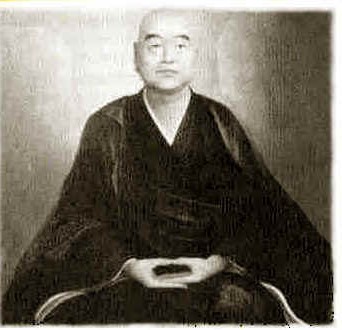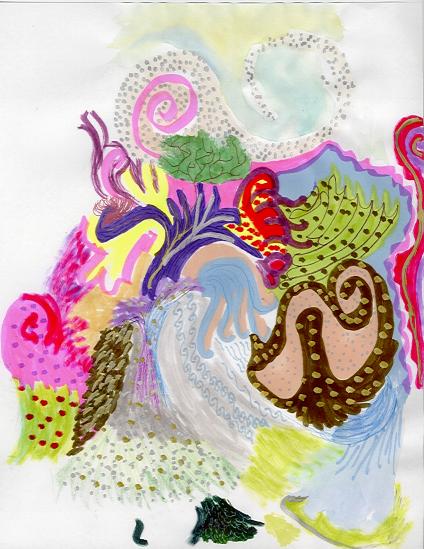

|
‘Hope smiles on the threshold of the year to come,
|
1 January 2011
|
|
Follow any analytic discipline, rigorously pursue any science or philosophy to its inexorable end, and you arrive at absurdity. From there, two paths diverge: toward despair of the overwrought intellectual, or toward the laughter of the gods. — Josh Mitteldorf |
2 January 2011
Zdzislaw Beksinski (1972) |
|
‘I am done with great things and big plans, great institutions and big success. I am for those tiny, invisible, loving human forces that work from individual to individual, creeping through the crannies of the world like so many rootlets or like the capillary oozing of water, yet which, if given time, will rend the hardest monuments of human pride.’ — William James |
3 January 2011
|
|
An ingredient found in abundance in birch bark appears to have an array of metabolic benefits, according to new studies in animals that are reported in the January issue of Cell Metabolism. In mice, the compound known as betulin lowered cholesterol, helped prevent diet-induced obesity, and improved insulin sensitivity. Betulin-treated mice were also more resistant to developing atherosclerotic plaques in their arteries. |
4 January 2011
|
|
On Humility Even those of us without gods are profoundly vulnerable to mistaking our
own perspective for Reality. The only protection against sanctifying our
own perceptions is to nurture a constant awareness of this profound,
universal human flaw. Like background music, a part of our minds must
always be asking, what am I distorting? what am I missing? how am I
being seduced and blinded by self-interest? We must cherish doubt, the
guardian of goodness and truth. And we must surround ourselves with
friends and advisors who help us to safeguard ourselves: People who ask
us hard questions. People who bear witness to our complicated motives.
People who ask us to think more deeply when we are spouting half truths. |
5 January 2011
|
|
Dog with a 1000+ word vocabulary Two South Carolina psychologists have spent three years training their Border Collie to distinguish among more than 1000 different toys, called by their names. They stopped training the dog after three years due to their time constraints, not because the dog could not learn more names. This study demonstrates Chaser’s ability to learn the names of proper nouns, and her extensive vocabulary was tested repeatedly under carefully controlled conditions. The authors admitted that she remembered the names of each of her 1022 toys better than they could. |
6 January 2011
|
|
Imagining life for early humans David Reed from the FL Museum of Nat History has determined that humans first started to wear clothing two ice ages ago, or about 170,000 years. Although the oldest crafted artifacts from human culture are only 35,000 years old, Reed was able to determine the date of clothing use by comparing the genomes of clothing lice to closely-related head lice. Counting the genetic differences in places that don’t matter, and hence are not subject to evolutionary pressures, is a standard biological clock. Reed determined that the clothing lice separated out as a species 170,000 years ago. The data shows modern humans started wearing clothes about 70,000 years before migrating into colder climates and higher latitudes, which began about 100,000 years ago. This date would be virtually impossible to determine using archaeological data because early clothing would not survive in archaeological sites. The study also shows humans started wearing clothes well after they lost body hair, which genetic skin-coloration research pinpoints at about 1 million years ago, meaning humans spent a considerable amount of time without body hair and without clothing, Reed said. “It’s interesting to think humans were able to survive in Africa for hundreds of thousands of years without clothing and without body hair, and that it wasn’t until they had clothing that modern humans were then moving out of Africa into other parts of the world,” Reed said. |
7 January 2011
|
|
Re-born A strange new youth is on me; not of song — G.K. Chesterton |
8 January 2011
|
|
You have a sense that the things you are anxious about are not the things that are making you anxious. Shouldn’t it be possible to do all the things that you do without the feeling you carry that there’s always something wrong? So you meditate, pursuing that state of mind in which you are satisfied in the moment, and there is no wish for things to be different. Meditation starts in the pursuit of a state in which there is a present realization of the world’s perfection, so that there is no desire for anything to be different, and it ends as just one more goddamned self-improvement project, (I hate doing it, but I’m investing in the future to make things better someday.) The paradoxical truth is that meditation does make your life better, but that it really only works to the extent that you can come to the practice with a attitude that ‘I’m doing this for its own sake, for the present experience, because it’s real and here and now.’ — Josh Mitteldorf |
9 January 2011
|
|
Liberté, Fraternité, Egalité A 93-year-old veteran of the WWII French Resistance has written a surprise best-seller – a call for non-violent insurrection and an overthrow of corporate-dominated state politics in Europe. ‘I would like everyone – everyone of us – to find his or her own reason to cry out. That is a precious gift. When something makes you want to cry out, as I cried out against Nazism, you become a militant, tough and committed. You become part of the great stream of history ... and this stream leads us towards more justice and more freedom but not the uncontrolled freedom of the fox in the hen-house.’ — Stéphane Hessel —> Independent article —> Articles by Hessel in French It is high time that ethics, justice and a sustainable balance prevailed. |
10 January 2011
|
|
Control of the means of production Evergreen Cooperatives is a network of employee-owned, environmentally-sensitive for-profit companies in Cleveland, OH. Within the world’s most intensely capitalist economy, employee ownership is a radical model for democracy in the workplace. Workers are motivated to build the company’s future, not this quarter’s bottom line. And, of course, management looks out for the workers when the management is the workers. |
11 January 2011
|
|
Lightning Number LIGHTNING among nature’s mysteries. No one really understands why huge voltages build up over distances in the sky. Even the process of discharge is controversial, with some physicists thinking they are triggered by cosmic rays, and others imagining that breakdown of the air is spontaneous. It is only in the last 15 years that astronomers have realized that gamma rays are emitted in connection with thunder storms. Electrons traveling very close to the speed of light must stop suddenly to make this happen. (This is how x-rays are generated in a dental x-ray. There, the electrons are stopped suddenly by a metal plate. What stops the electrons so suddenly in a lightning discharge?) Just this week, anti-matter streams were detected coming from the earth by orbital astronomical observatories that are designed to detect cosmic rays from space. |
12 January 2011
|
|
Practical mystic In 17th Century Europe, all discussions of morals took place in the context of theology. What did Jesus want from us? Antoinette Bourignon, born this day in 1616, was inspired by direct communications from God, but her message had practical content. She assailed the view of Protestants and Catholics alike that faith in Jesus, rather than good deeds, was God’s criterion for admission into heaven. She asserted free will, and denied pre-ordination and fatalism. As a teenager in 17th-century Belgium, Antoinette Bourignon had deep spiritual longings her family and town priest could not satisfy. One night as she prayed, a voice spoke to her: Forsake all earthly things. Separate thyself from the love of the creatures. Deny thyself. Antoinette took these intuitions earnestly. But her parents would not allow her to enter a convent. When they betrothed her to a wealthy merchant, she kept putting off the wedding date. One morning, dressed in a hermit’s habit she had sewn herself, she stole into the pre-dawn darkness. She had stashed a penny in her pocket to buy bread, but the voice asked, “Where is thy faith...in a penny?” so she tossed it away. “Thus,” a disciple would later write, “she went away wholly delivered from the heavy burden of the cares and good things of this world and found her soul so satisfied that she no longer wished for anything upon earth.” Later Antoinette served in a convent and supervised an orphanage. Meanwhile, she began formulating her own spiritual philosophy. A century after Martin Luther’s reform movement, she began traveling throughout France, Belgium and Holland preaching her brand of Christian mysticism. For the next four decades, Antoinette promoted Quietism. She carried a wooden printing press with her. In each town she set it up and laboriously produced 250 pages an hour of pamphlets promoting direct, personal experience with God. ‘’ “” — Rebecca Bartholomew, author of Lost Heroines: Little-Known Women Who Changed Their World |
13 January 2011
|
|
Rethinking grief Grief is “a grab bag of symptoms that come and go and, eventually, simply lift.” What really determines how you grieve is simply how resilient your personality is in general. — Boston Globe article on the works of Ruth Davis Konigsberg |
14 January 2011
|
|
Through the practice of meditation, we begin to find that within ourselves there is no fundamental complaint about anything or anyone at all. * In the spirit of defying the airbrush: Chogyam Trungpa was one of
many inspired teachers |
15 January 2011
|
|
Prose What could be more worthy of my passionate effort than to make this moment come alive? What if I were to focus the intensity of my passion not on getting what I (think I) want, nor on alleviating suffering in the world around me nor even on self-expression, but instead worked just as hard as I could to open myself to the now, to be present with what is, to make this moment come alive? I’ll tell you what: It wouldn’t work. It would just make me anxious and self-conscious. No, if I wish to be fully alive in this moment, the best thing I can do would be to focus my passion on getting what I want... and resolve to be aware through the process. — Josh Mitteldorf Going after what you want is a good thing, not because you’ll get what you |
16 January 2011
|
|
Rhyme
Since every worldly goal is mere delusion,
And abandoned all to seek realization:
No! I’d be a sanctimonious bore: — Josh Mitteldorf |
17 January 2011
|
|
Rotating cows Climate change has arrived, and Australia is experiencing a historic 10-year draught. Tony Lovell thinks it may be more practical to adapt to the change locally rather than organize globally, trying even now to avoid it. In natural ecosystems in dry areas, herds of grazing animals eat the grass down to the roots once a year, then move on, allowing the grass to recover. In contrast, ranches are designed to let cows graze continually. Since the grass is always at a low level, its growth is slowed. Semi-arid prairie can be transformed into lush grassland. More moisture is retained, and more carbon is returned to the soil, enriching the topsoil while reducing the carbon footprint. ‘What is more exciting is that almost any farmer can adopt the system. All you need is a few fences. Then you build lots of small paddocks, form your cattle into a big herd, and put them in each one for just a day or two.’ Read New Statesman article by Mark Stevenson |
18 January 2011
|
|
Chain of logic Studying the Buddha way is studying oneself. Studying oneself is forgetting oneself. Forgetting oneself is being enlightened by all things. Being enlightened by all things is to shed the body-mind of oneself, and those of others. No trace of enlightenment remains, and this traceless enlightenment continues without end. — Dogen Zenji, born this day in 1200 AD Q: If all humans are born with Buddha nature, why is it so hard to
realize? |
19 January 2011
|
|
Blindfolded dolphin A blindfolded dolphin is able to imitate on command the motions and tricks performed by a friend and tank-mate. How does he know what the other dolphin is doing? Is dolphins sonar so exquisitely sensitive that they can ‘see’ details of another dolphin’s motion?* Or are they communicating with clicks and whistles? Or are they just so well-tuned to interpretation of splashing sounds that they can tell what motion created what kind of splash? How about telepathy? — AP Article — Journal Article *Note added 1/21: After reading the full article I am less convinced that the dolphin’s feat is extraordinary. Many of the behaviors that Tanner imitated were associated with vocalizations, and some others had distinctive splashes. The success rate was 75% for the vocalizations, and 41% for the swimming stunts. It is possible that all the success could be attributable to sharp ears. |
20 January 2011
|
|
“So long as we have enough people in this country willing to fight for their rights, we’ll be called a democracy.” — Roger Nash Baldwin, born this day in 1884 I am for socialism, disarmament, and, ultimately, for abolishing the state itself... I seek social ownership of property, the abolition of the propertied class, and the sole control for those who produce wealth. |
21 January 2011
|
|
Musical Citizen of the World ‘Alexander Tcherepnin’s view of music as a moral force that breaks down artificial barriers between peoples has a special relevance in our own troubled times.’ [Tcherepnin Society] Listen to his wind quintet |
22 January 2011
|
|
The world is full of unfairness and injustice, and I have been the beneficiary far more often than I have been the victim. The deck has been stacked in my favor. May this realization inspire not reticence or self denial, but generosity. — Josh Mitteldorf |
23 January 2011
|
|
«Tous les sentiments forts sont purs de leur essence.» ‘Every strong sentiment emboidies an essential purity.’ «La raison, pour nous, c’est la mort : à calculer, tout calculer... nous périrons avant l’heure.» ‘Pure reason will be our demise. Calculating, ever calculating, we perish before our time.’ — Delphine-Gay de Girardin, born this day in 1804 |
24 January 2011
|
|
Echo of the Gilded Age ‘This, then, is held to be the duty of the man of Wealth: First, to set an example of modest, unostentatious living, shunning display or extravagance; to provide moderately for the legitimate wants of those dependent upon him; and after doing so to consider all surplus revenues which come to him simply as trust funds, which he is called upon to administer, and strictly bound as a matter of duty to administer in the manner which, in his judgment, is best calculated to produce the most beneficial results for the community — the man of wealth thus becoming the mere agent and trustee for his poorer brethren, bringing to their service his superior wisdom, experience, and ability to administer, doing for them better than they would or could do for themselves.’ — Andrew Carnegie (1835-1919) |
25 January 2011
|
|
Dawn of the Spirit Quand chez les débauchés l’aube blanche et vermeille
Des Cieux Spirituels l’inaccessible azur,
Sur les débris fumeux des stupides orgies
Le soleil a noirci la flamme des bougies; — L’Aube Spirituelle, par Charles Baudelaire When to the drunkard’s room the flushing East Deep vaults of inaccessible azure there, Over the stupid orgy’s reeking track The sun has turned the candles’ flame to black; — English rendering by Lewis Piaget Shanks (1931) salvation is not just for the worthy –ed |
26 January 2011
photo courtesy of |
|
Let go the fiction of life and death The ego is a monkey catapulting through the jungle: Totally fascinated by the realm of the senses, it swings from one desire to the next, one conflict to the next, one self-centered idea to the next. If you threaten it, it actually fears for its life. Let this monkey go. Let the senses go. Let desires go. Let conflicts go. Let ideas go. Let the fiction of life and death go. Just remain in the center, watching. And then forget that you are there. — Lao Zi, Hua Hu Jing, Brian Walker translation |
27 January 2011
|
|
Visionary Common Sense: ‘If our nation can issue a dollar bond, it can issue a dollar bill.
Both are promises to pay, but one promise fattens the usurers and the
other helps the people.’ ‘It is well that the people of the nation do not understand our
banking and monetary system, for if they did I believe there would be a
revolution before tomorrow morning.’ Both quotes from the NY Times, 6 Dec 1921. The money supply must expand to keep pace with the economy, otherwise deflation occurs. The amount of that expansion is a boon that belongs to We the People. It has been usurped by Them the Bankers. |
28 January 2011
|
|
The Old Astronomer to His Pupil Reach me down my Tycho Brahe, I would know him when we meet,
Pray remember that I leave you all my theory complete,
But, my pupil, as my pupil you have learned the worth of scorn,
You may tell that German College that their honor comes too late, — Sarah Williams (British, 1837-1868) |
29 January 2011
|
|
With a little forethought, you can arrange to have more spontaneity in your life. With practice and discipline, you can train yourself to be free. — Josh Mitteldorf |
30 January 2011
|
|
Schubert Franz Schubert was born 31 January 1997, and died in obscurity before his 32nd birthday. Almost all the music we treasure was rescued from trunks in his apartment. Not only the ‘Unfinished’ 8th Symphony, but also the ‘Great’ 9th and the charming, Mozartian 5th, both staples of the orchestral repertoire, remained unpublished in his lifetime. His greatest chamber works, including my personal favorite the String Quintet, were also known only to a handful of Schubert’s associates in Vienna. Luciano Berio was a 20th Century Italian composer of experimental and avant garde music mixing classical themes with synthesized sounds and voice, spoken and sung. His tribute to Schubert is a setting of orchestral fragments that were ongoing projects at the time of Schubert’s death. Rather than try to ‘reconstruct’ according to any conjecture about Schubert’s intention, Berio quotes the fragments verbatim and retreats from there into a dreamy orchestral texture. The effect is like walking through a fog, from which glimpses of a distant city edifice emerge for a time, then retreat once again behind the mist. This is the third of three movements based on Schubert’s orchestral fragments. (Listen for the main theme from the first movement of the Quartet Death and the Maiden, also embedded in the fog.) |
31 January 2011
|



























